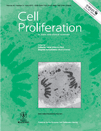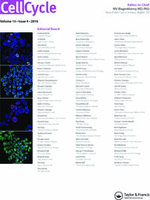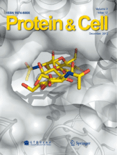
CELL BIOLOGY AND TOXICOLOGY
Scope & Guideline
Exploring the Intersections of Life and Toxicity
Introduction
Aims and Scopes
- Cellular Mechanisms of Toxicity:
Exploration of the cellular and molecular mechanisms by which toxic substances induce damage, apoptosis, or alterations in cellular functions. - Therapeutic Targets and Interventions:
Identification and validation of novel therapeutic targets, with a focus on how cellular responses to toxic agents can inform treatment strategies for various diseases. - Role of Non-Coding RNAs:
Investigation into the roles of non-coding RNAs, including microRNAs and long non-coding RNAs, in regulating cellular responses to stress and toxicity. - Stem Cell Biology and Regenerative Medicine:
Research on the applications of stem cell-derived therapies to mitigate toxic effects and to restore cellular function in damaged tissues. - Environmental and Chemical Toxicology:
Assessment of the impact of environmental pollutants and chemicals on cellular health, with a focus on their mechanisms of toxicity and potential health implications. - Innovative Methodologies in Toxicology:
Development and application of novel experimental techniques, including high-throughput screening and advanced imaging methods, to study cellular responses to toxic substances.
Trending and Emerging
- Exosomal Communication and Biomarkers:
Increasing emphasis on the role of exosomes in cell communication and as potential biomarkers for various diseases, highlighting their significance in both diagnosis and therapeutic strategies. - CRISPR and Gene Editing Technologies:
Growing interest in utilizing CRISPR and related gene-editing technologies to explore gene function in the context of toxicity and disease, showcasing their potential for advancing personalized medicine. - Metabolic Reprogramming in Cancer:
A rising focus on how toxic agents influence metabolic pathways in cancer cells, revealing new insights into tumor biology and potential therapeutic targets. - Mechanisms of Ferroptosis and Other Non-Apoptotic Cell Death Pathways:
Emerging research into ferroptosis and other non-apoptotic forms of cell death, providing deeper understanding of their roles in disease processes and responses to toxic substances. - Nanoparticle Toxicity and Applications:
Increased investigation into the toxicity of nanoparticles, their cellular interactions, and potential therapeutic applications, reflecting the growing relevance of nanotechnology in biomedicine.
Declining or Waning
- Traditional Toxicological Assays:
Publications focusing on classical toxicological assays are becoming less frequent, as researchers shift towards more innovative, high-throughput methods that provide deeper insights into cellular responses. - In Vivo Toxicity Studies:
There is a noticeable reduction in studies primarily focused on in vivo toxicity assessments, with a growing preference for in vitro models that offer more controlled environments for examining cellular mechanisms. - Generalized Mechanisms of Cell Death:
Research that broadly discusses mechanisms of cell death without specific context or application is waning, as there is a trend towards more targeted studies investigating specific pathways and their implications in disease.
Similar Journals

CELL PROLIFERATION
Shaping the Future of Medicine Through Cellular InsightsCELL PROLIFERATION, published by Wiley, is a leading open-access journal that has been at the forefront of research since its inception in 1968. With an impact factor that solidifies its position in the Q1 category of both Cell Biology and Medicine (Miscellaneous), this journal serves as a premier platform for disseminating groundbreaking studies in the field of cellular and molecular biology. The journal is renowned for its rigorous peer-review process and comprehensive coverage of topics related to cell growth, division, and differentiation, making it an invaluable resource for researchers, professionals, and students alike. With its notable Scopus ranking of #30 in Biochemistry, Genetics, and Molecular Biology: Cell Biology, and a robust open access model since 2019, CELL PROLIFERATION ensures that cutting-edge research is accessible to a global audience, fostering collaboration and innovation across the scientific community. Located in the United Kingdom, the journal remains committed to enhancing the understanding of cellular processes, thereby influencing developments in medicine and biotechnology.

CELLULAR SIGNALLING
Advancing the Frontier of Cellular MechanismsCELLULAR SIGNALLING, published by Elsevier Science Inc, is a premier journal within the realm of Cell Biology, boasting an impressive Q2 category ranking as of 2023. With an ISSN of 0898-6568 and an E-ISSN of 1873-3913, the journal has established itself as a critical platform for advancing the understanding of cellular mechanisms and signal transduction pathways since its inception in 1989. Covering a vast array of topics in Biochemistry, Genetics, and Molecular Biology, it ranks notably at 87 out of 285 in the Scopus list, placing it in the 69th percentile among its peers. The journal serves as an invaluable resource for researchers, professionals, and students seeking high-quality, impactful studies that drive forward the field of cellular biology. While it operates under traditional subscription access, its highlights include rigorous peer-reviewed articles, reviews, and insights that continue to shape current scientific discourse.

CELLULAR AND MOLECULAR LIFE SCIENCES
Fostering Breakthroughs in Cellular and Molecular ResearchCELLULAR AND MOLECULAR LIFE SCIENCES, published by SPRINGER BASEL AG, stands as a premier journal dedicated to advancing the field of cellular and molecular biology. With an impressive 2023 impact factor reflected in its Q1 rankings across key categories—including Cell Biology, Molecular Biology, and Pharmacology—it serves as a critical platform for researchers aiming to disseminate high-quality findings in these dynamic fields. Operated under an open access framework, the journal allows broader accessibility to groundbreaking research, fostering collaboration amongst scientists globally. Based in Switzerland, CELLULAR AND MOLECULAR LIFE SCIENCES has been at the forefront of scientific publishing since 1952, adapting to contemporary scientific challenges and trends, ultimately shaping the future of life sciences.

AMERICAN JOURNAL OF RESPIRATORY CELL AND MOLECULAR BIOLOGY
Unveiling New Horizons in Cell and Molecular BiologyThe AMERICAN JOURNAL OF RESPIRATORY CELL AND MOLECULAR BIOLOGY, published by the esteemed American Thoracic Society, is a premier platform dedicated to advancing knowledge in the fields of pulmonary and respiratory medicine, cell biology, and clinical biochemistry. With an impressive impact factor and recognition as a Q1 journal in multiple categories for 2023, it ranks among the top tier of scholarly publications, evidencing its influence and contribution to the scientific community. Since its inception in 1989, the journal has provided a critical forum for researchers and professionals to disseminate innovative findings and pivotal reviews, driving forward the frontiers of respiratory biology. While the journal currently operates under traditional access mechanisms, it seeks to bridge gaps in research by presenting high-quality articles that address vital health challenges. As a key resource for both established researchers and emerging scholars in molecular biology and respiratory science, this journal plays a pivotal role in shaping the future of respiratory health advancements.

CELL CYCLE
Leading Insights into Molecular and Developmental Biology.CELL CYCLE, an esteemed journal published by Taylor & Francis Inc., stands at the forefront of biological research, focusing on the intricate mechanisms of cell proliferation, molecular biology, and developmental biology. With an ISSN of 1538-4101 and an E-ISSN of 1551-4005, this journal has established its influence in the field with a commendable impact factor reflecting its rigorous peer-review process and high-quality publications. Notably, in 2023, it achieved a Q1 ranking in Medicine (miscellaneous) and a Q2 ranking in both Cell Biology and Developmental Biology, marking its vital role in advancing scientific understanding and innovation. Operating within a converged framework from 2002 to 2024, CELL CYCLE caters to a diverse audience of researchers, professionals, and students eager to explore contemporary findings and emerging trends. The journal's objective is to disseminate groundbreaking research that enhances our understanding of cellular mechanisms, fostering collaboration and innovation. Although not an open-access journal, it remains a premier source for those engaged in cell cycle research, and its contributions have significant implications for fields such as healthcare, biotechnology, and genetics.

Journal of Cell Communication and Signaling
Elevating Research in Biochemistry and Molecular BiologyThe Journal of Cell Communication and Signaling is a prestigious academic journal published by Springer, focused on advancing the understanding of cellular communication mechanisms and signaling pathways. Since its inception in 2007, this journal has established itself as a leading platform in the field, with a strong impact reflected in its 2023 categorizations: Q1 in Biochemistry, Q2 in Cell Biology, and Q2 in Molecular Biology. Researchers from around the globe rely on its rigorous peer-reviewed articles to gain insights into the complex molecular dialogue that underpins various biological processes. With an ISSN of 1873-9601 and E-ISSN of 1873-961X, the journal is committed to disseminating high-quality research that informs both academic studies and practical applications in biotechnology and medicine. Although not an open access publication, it provides essential resources tailored for professionals, students, and researchers, enhancing their knowledge of critical signaling pathways that drive health and disease. The journal is located in the Netherlands, at VAN GODEWIJCKSTRAAT 30, DORDRECHT, and stands out in the field, boasting impressive ranks among its peers in the Scopus database.

Frontiers in Toxicology
Fostering Collaboration in Toxicology ResearchFrontiers in Toxicology, published by Frontiers Media SA, is a prominent open-access journal dedicated to advancing the understanding of toxicological science. Established in 2019, it serves as a vital forum for innovative research, offering insights into the pharmacological impacts and toxicological profiles of various substances. With its international reach based in Switzerland, this journal has quickly ascended in the academic community, achieving a notable Q1 ranking in Pharmacology, Toxicology and Pharmaceutics (Miscellaneous) and a Q2 ranking in Toxicology as of 2023. The journal is indexed in Scopus, where it ranks #8 out of 43 in its primary category, underscoring its influence and relevance in the field. The scope encompasses cutting-edge studies on the mechanisms of toxicity, including both human and environmental impacts, making it an essential resource for researchers, professionals, and students alike. By promoting open access to high-quality research, Frontiers in Toxicology plays a crucial role in enhancing knowledge sharing and fostering collaboration across disciplines.

TRENDS IN CELL BIOLOGY
Transforming Understanding of Cellular ComplexityTRENDS IN CELL BIOLOGY, published by CELL PRESS, is a premier journal in the field of cell biology, recognized for its high-impact contributions since its inception in 1991. As a distinguished member of the Q1 quartile within its category, the journal holds an impressive Scopus ranking of #8 out of 285, placing it in the 97th percentile of the field, which underscores its reputation for excellence. The journal serves as an essential resource for researchers, professionals, and students who are engaged with groundbreaking advancements in biochemistry, genetics, and molecular biology. Although it is not open access, it provides critical insights into the latest trends, reviews, and advancements in cell biology, making it a crucial tool for anyone committed to understanding the complexities of cellular systems. With a focus on innovative and transformative research, TRENDS IN CELL BIOLOGY continues to shape the discourse in cell biology and enhance the scientific community's knowledge.

Protein & Cell
Advancing Knowledge in Biochemistry and Cell BiologyProtein & Cell, published by Oxford University Press, is a distinguished international journal focusing on cutting-edge research in the fields of biochemistry, biotechnology, cell biology, and drug discovery. This open access journal, active since 2014, is dedicated to disseminating innovative findings that advance our understanding of protein functions and cellular processes, making it an essential resource for researchers, professionals, and students alike. With an impressive 2023 impact factor reflected in its Q1 ranking across multiple categories such as Biochemistry, Drug Discovery, and Cell Biology, 'Protein & Cell' stands at the forefront of scientific research, driving collaboration and discussion in the scientific community. Researchers can access the journal freely online, fostering a global exchange of knowledge and contributing to significant advancements in medicine and biotechnology. Located in the United Kingdom, the journal strives to be a pivotal platform for impactful research that influences future studies and applications.

IN VITRO CELLULAR & DEVELOPMENTAL BIOLOGY-ANIMAL
Illuminating the Path of In Vitro StudiesIN VITRO CELLULAR & DEVELOPMENTAL BIOLOGY-ANIMAL, published by SPRINGER, is a pivotal journal in the fields of cell biology and developmental biology, focusing on in vitro studies that enhance our understanding of animal cellular mechanisms and development. With an ISSN of 1071-2690 and an E-ISSN of 1543-706X, this esteemed journal offers a platform for researchers to present their findings and contribute to the body of knowledge necessary for advancements in biological sciences. As a recognized publication, it holds a 2023 category quartile of Q4 in Cell Biology and Developmental Biology, and Q3 in miscellaneous Medicine, reflecting its competitive position yet inviting critical submissions that can span multidisciplinary approaches. Though currently not open access, it serves as an essential resource for professionals, researchers, and students dedicated to unraveling the complexities of cellular processes in an ever-evolving field. The journal has been continuously published since 1986, signifying its long-standing commitment to fostering scientific discourse and innovation.